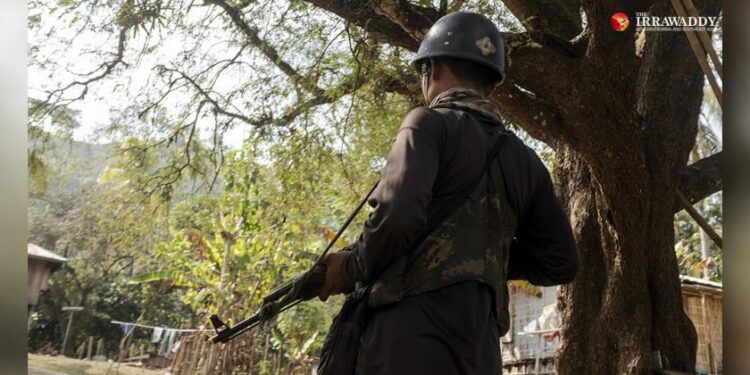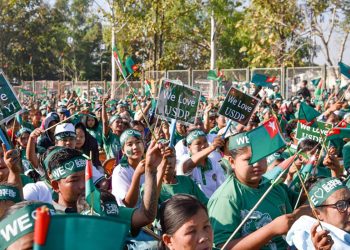Yangon — The Chin Human Rights Organization (CHRO) has accused the Arakan Army (AA) of forcing Paletwa residents in southern Chin State to sell rice to the armed group at low prices, despite food shortages caused by fighting between the AA and government troops.
The CHRO is a non-governmental organization, which has had a special consultative status with the United Nations Economic and Social Council since 2018. It says it works to protect and promote human rights through monitoring, research, documentation, education and advocacy on behalf of Chin people.
It has been sending monthly reports on human rights abuses amid the fighting between Myanmar’s military and the AA to foreign embassies and international agencies monitoring violations in Myanmar.
The AA has been fighting the military since 2018 to achieve its stated objective of a confederation for Rakhine State. It is also fighting in Paletwa, as the strategically located town borders Rakhine.
CHRO spokesman Salai Lian said the AA only gave 40,000 kyats (US$31) for a sack of rice, while the market price is 75,000 kyats ($58).
The CHRO report on Tuesday said villagers forced to carry rice sacks to AA outposts were paid 2,000 kyats ($1.5) per sack for their labor.
“The rice supply is limited because the AA is buying rice from the villagers and the situation is serious. According to our records, the AA has been extorting rice and money for two years. Currently, they are buying rice at Ngasha village-tract. We received reports that the AA fined those who can’t afford to sell rice,” said Salai Lian.
“We are making detailed records. We have received reports that other villages are also forced to sell rice. For the time being, we can only confirm the case in five villages. But I am sure more than five villages are facing this,” he said.
AA information officer Khaing Thukha denied the CHRO’s claims, accusing the organization of trying to tarnish the group’s reputation as it dislikes its presence in Paletwa.
“We have instructed our members not even to bargain when they buy things. As people are destitute in Paletwa, we don’t even levy taxes there,” Khaing Thukha told The Irrawaddy.
Rice prices are much higher in Paletwa than elsewhere due to the challenges of transporting rice to the township.
“Division 77 [of Myanmar’s military] charges 50,000-200,000 kyats [$39-155] per vessel in Paletwa. And they charge 10,000-20,000 [$8-16] kyats per sack of rice that comes from Lailinpi in Shinletwa upriver from Paletwa. But those human rights organizations have not spoken about it. Rice prices have increased because the Bamar [Myanmar’s] army blocks transport routes. But rights organizations do not speak about it. We question the impartiality of those who issued the report,” said Khaing Thukha.
The Irrawaddy is not able to independently verify Khaing Thukha’s claims about Myanmar’s military charging freight vessels.
Chin State municipal affairs minister U Soe Htet said the villages where the AA is buying rice are beyond the government’s reach.
“Rice costs 65,000-70,000 kyats per sack in areas upstream from Paletwa. It is said the AA pays 40,000 kyats [$31] for a sack. It is difficult to buy rice but people are forced to give their rice to the AA,” said U Soe Htet.
Paletwa Township is only accessible by water from Kyauktaw in Rakhine State and by road from Matupi. The township brings in most of its food from Kyauktaw on the Kaladan River.
Fierce clashes near Paletwa in February and March effectively blocked transport between Paletwa and Kyauktaw, leaving Paletwa’s 100,000 residents short of food.
Prices have since increased from 35,000-40,000 kyats [$27-31] per 50kg sack to between 75,000-100,000 kyats [$58-77]. Residents can only buy rice from the state government.
The government limits sales to 10 liters of rice per household in Paletwa, said U Yar Kyaw, who heads the township’s food security committee.
“There has been no rice in shops and we only get 10 liters from the state government. We had to buy it. We have six people in our family. Luckily, I still have some rice that I have kept. We will have none after it runs out and can’t buy anymore,” said U Yar Kyaw.
His committee tried to buy supplies from outside Paletwa but failed because of the lack of transport security, he said.
Translated from Burmese by Thet Ko Ko
You may also like these stories:
Artillery Shell Kills Boy in Former Myanmar Tourist Hotspot Mrauk-U
Students Face Prosecution for Protest Against Rakhine Govt, Myanmar Military in Sittwe
Myanmar Military Calls in Jets to Attack Arakan Army in Rakhine State Mountains

















